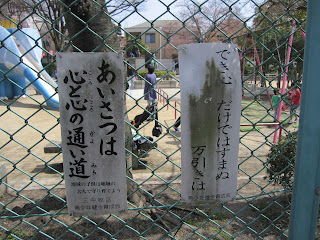 |
| Elvira, Mistress of the Dark on her red velvet settee. |
Halloween is almost upon us and I am reminded of my first love.
When I was a teenager in the 80's I would stay up very, very, very late on Friday or Saturday nights to watch 'Movie Macabre' hosted by Elvira, the Mistress of the Dark.
Mistress = aijin 愛人 {Lover} on'nashujin 女主人 {Female head or owner. Feminine of 'Master'}
'Movie Macabre' (macabre = 死 shi (no) {of death}; kimi ga warui 気味が悪い{gruesome})
was a TV show that showed old, B grade horror movies. B grade as in BAD! So bad! Very cheaply made, bad, old horror movies with monsters in rubber masks and, even worse, very bad acting. These movies were so bad that nobody would ever want to watch them, except.... they were hosted by the one and only Elvira! !
Oh my God Bless the USA! I would even watch old men playing golf if only Elvira hosted the event!
I had a few pictures of her ripped from horror movie magazines posted in my school locker.
She set my hormone - saturated teenage heart beating like nothing else! She would make any guy, young or old, single or engaged, gay or straight stay up late just to listen to her mischievous (いたずらな itazura na) bad jokes, laugh at how bad the movie was, and just to get a look at her beautiful.... uhmm, ... legs!
 |
| Elvira! What big... eyes you have! |
(beckon = temaneki suru 手招きする).
Sometimes, where I lived, they even showed a double feature with two episodes of 'Movie Macabre' back-to-back! I never got enough sleep on those nights! I tried so very hard to stay up late and watch every minute because I didn't want to miss any of her silly shenanigans (mischief = 茶目 chame - harmless teasing). I would stay up 'til dawn (yoake よあけ) sometimes. Even when I got drowsy and started falling asleep I would pinch (tsuneru つねる) myself to wake up to watch Elvira come on between commercial breaks and at the end of the film to make jokes and play seductively to the camera. I was completely mesmerized (mesmerize = miwaku 魅惑)! I would try to hold out until the end of the show when she always looked right into the camera, waved her long slender fingers and said those two sweet words that meant I could finally turn off the TV and fall completely asleep; those two words that still echo softly in my mind.... "Unpleasant dreams....."
Later in life, around 1998-9 or so, I actually got to meet Cassandra Peterson (a.k.a. Elvira) briefly at 'Terror on Church Street' the haunted attraction where I worked. She was not in costume but was still very pretty and so sweet and kind. I was a little star-struck but managed to say "I'm a really big fan" as I shook her hand. Somewhere in a box I have a photo of my co-workers and I with her. If I find it I'll post it up here.
 |
| Actress Cassandra Peterson |
But as for me, NOBODY can ever replace the ultimate funny femme fatale.... Elvira.
Below you can watch some clips of Elvira doing what she does best...
In this clip she introduces and concludes the film 'She-Demons' for a vhs video tape release:
If you enjoy Elvira you can find many postings of her on Youtube or discover more at her official website:
http://elvira.hostedbywebstore.com
Or an officially unofficial fan site:
http://www.elviramistressofthedark.com
![]()
Below you can watch some clips of Elvira doing what she does best...
In this clip she introduces and concludes the film 'She-Demons' for a vhs video tape release:
 |
| Striking a pose... very striking! |
In this clip she introduces the cult B movie 'Attack of the Killer Tomatoes' on Movie Macabre...
This next clip is more recent...
http://elvira.hostedbywebstore.com
Or an officially unofficial fan site:
http://www.elviramistressofthedark.com












































